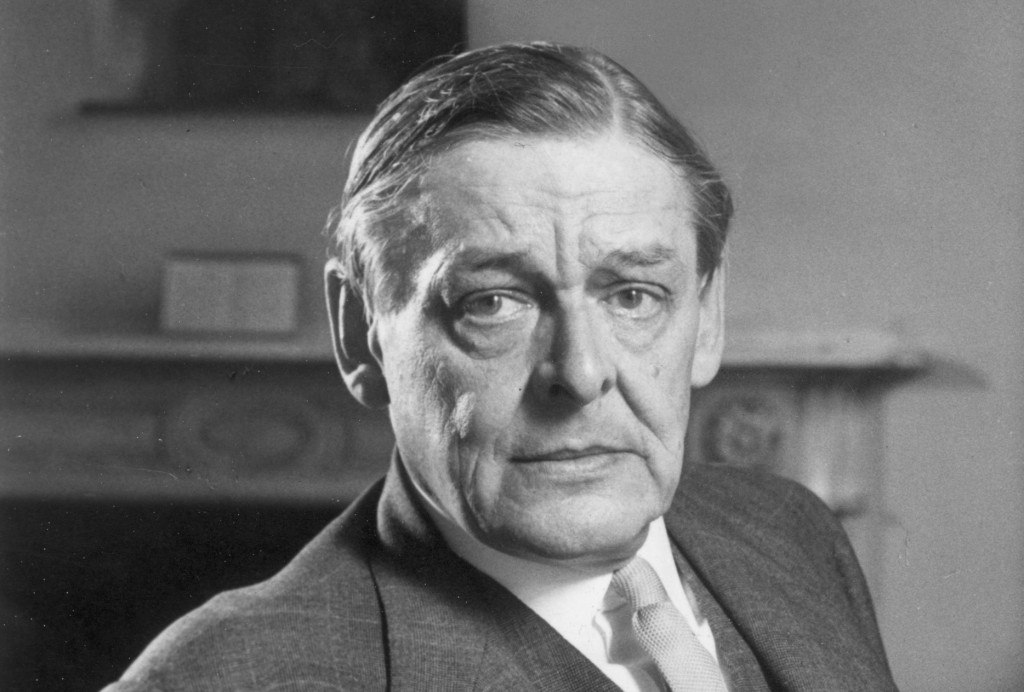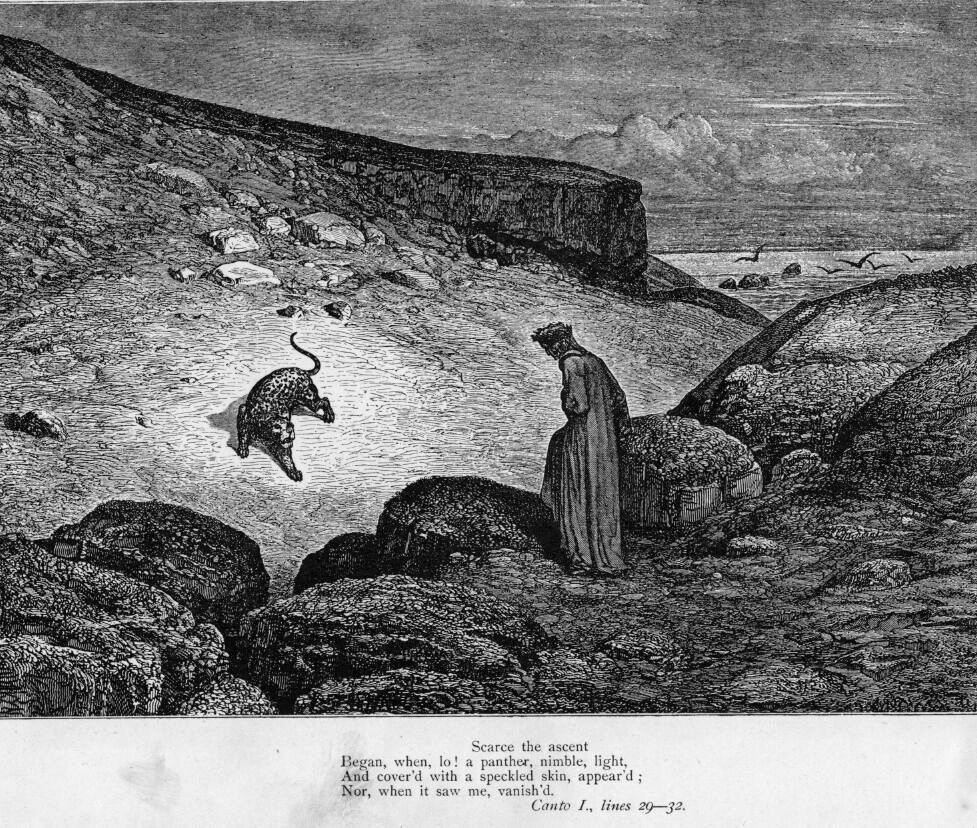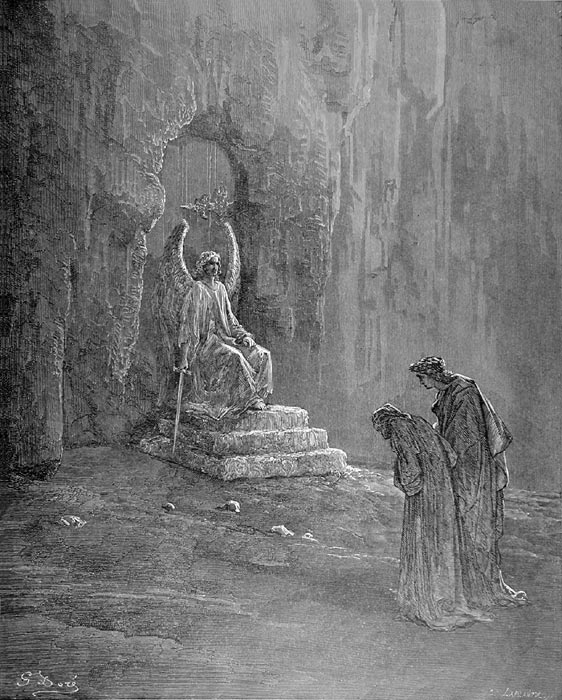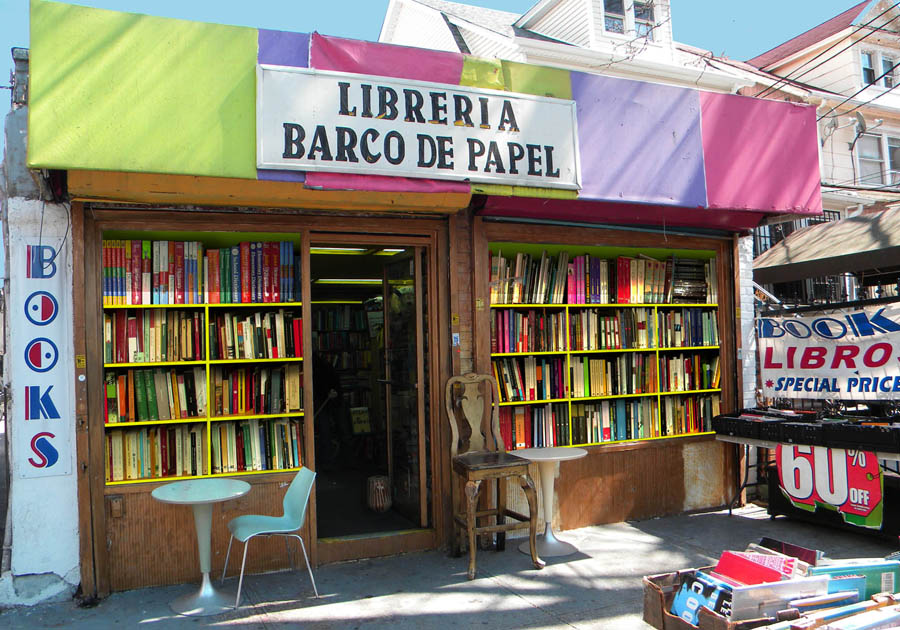
Dejando aparte el “intelectualismo” del que frecuentemente se le acusa A Eliot (muchas veces como forma de contraponer su figura a las de sus contemporáneos Dylan Thomas y W. H. Auden, poetas más netamente líricos), la poesía de T. S. Eliot presenta tres vertientes fundamentales, facetas en apariencia contradictorias entre sí, pero que el gran artista armonizaba sabiamente. La primera, una vena humorística muy sui generis. El autor era muy aficionado a la bagatela satírica y el chascarrillo irónico, visibles en libros como el primero que publicó, en 1917, Prufrock y otras observaciones, o en El libro de los gatos habilidosos (1939), en el cual está basada la famosa comedia musical Cats, de Andrew Lloyd Weber.
La segunda, el arrebatado vanguardismo o experimentalismo literario;20 no en vano, junto a Wallace Stevens y Ezra Pound, fue el gran representante del modernism inglés (véase modernismo anglosajón), que nada tiene que ver con nuestro «modernismo»: La tierra baldía.
Su tercera faceta es, sin duda, la meditativa y religiosa. El tono trascendente y penitencial adquiere una enorme presencia a lo largo de toda su obra, y del encuentro de elementos tan dispares (la tradición y la novedad, las bromas y las veras, lo sagrado y lo profano, podríamos decir o, como veremos después, la fe y el nihilismo) emanará, en síntesis, la, para algunos, poesía mayor del siglo XX; «una intensa atracción por la belleza junto a una igualmente intensa fascinación por la fealdad, la cual contrasta con ella y acaba destruyéndola», afirmó en uno de sus ensayos. Damaso López García traza muy bien una síntesis de estos llamativos contrastes en su introducción a Inventos de la liebre de marzo, recopilación de los primeros poemas de Eliot, aparecida tras fallecer éste.
Como se ha dicho, Eliot, ya bien entrada la madurez, se convirtió inopinada y espectacularmente al anglicanismo; eso explica la importancia del sentimiento religioso en su vida, que de modo espontáneo trasladaría a su poesía. Dicho trasvase se plasma, de entrada, a través de la incorporación, aquí y allá, de innumerables citas tomadas de la Biblia, de obras de santos, del Dante, así como de textos sagrados orientales. Son frecuentes asimismo las referencias a episodios o lugares con fuerte significación religiosa, como en la que muchos juzgan su obra maestra, Cuatro cuartetos (1943). Pero Eliot llegó más lejos. En un tiempo convulso, cínico y descreído como el que le tocó vivir, marcado además por dos guerras mundiales, no se abstuvo de sacar a la luz directamente un ramillete de poemas “religiosos”, casi a imitación de la clerecía medieval: Viaje de los magos (1927), Miércoles de ceniza (1930, dedicado a la Virgen María), los coros de La piedra (1934, a favor de la construcción de nuevos templos), etc. Pero el fervor devoto en él —artista imbuido hasta la médula en el espíritu, dice Valverde, cínico y hueco de su siglo— muchas veces parece ser sólo aparente.
Al igual que el español Miguel de Unamuno, Eliot revela un talante místico al menos titubeante, en el cual la fe se ha visto considerablemente atemperada o enfriada, si no sustituida, por la desengañada meditación racional, siempre a vueltas con un tema metafísico de fondo: en el caso de Eliot, el incomprensible devenir del tiempo (Cuatro cuartetos).
En efecto, observemos en uno de los poemas puramente “religiosos” ya citados, Miércoles de ceniza:
Porque no tengo esperanza de volver otra vez
Porque no tengo esperanza
Porque no tengo esperanza de volver
Sección que concluye muy canónicamente:
Ruega por nosotros pecadores, ahora y en la hora de nuestra muerte.
Estos versos no se sabe si traslucen fe o desesperanza, si bien el efecto poético de contrastes como éste, unido a los atrevidos recursos formales empleados, lejos de restringir la intensidad lírica, la amplifica notablemente. Sus composiciones en imágenes brindan originales resonancias, profundos e inesperados visos espirituales; una riqueza y variedad de registros rara en la poesía del pasado siglo, si obviamos a uno de sus grandes contemporáneos, el portugués Fernando Pessoa.
«…una lectura de los cantos pertenecientes al Paraíso Terrenal del Purgatorio de Dante lo prepara a uno para el aire enrarecido de la escena de Eliot, tal como una cierta familiaridad con Dante podría ayudar a enfrentar lo inesperado de los leopardos que surgen justo en el primer versos de la segunda parte de Miércoles de ceniza. Con todo, resulta equivocado ver estas cosas sencillamente como referencias a Dante. No son rehenes tomados de La divina comedia y capturados por el arte de Eliot dentro del ascético recinto de su poema. De hecho surgieron en la mente pura del poeta del siglo veinte, y su lugar propio no se deriva de haber trasplantado su significado de la iconografía medieval» — Seamus Heaney, Hablar de Poesía.

Miércoles de ceniza (versión de Ezequiel Zaindenwerg)
I
Porque no espero retornar jamás
Porque no espero
Porque no espero retornar
Deseoso del don de éste y de la visión de aquél
Ya no me esfuerzo más por esforzarme por cosas semejantes
(¿Por qué debiera desplegar las alas el águila ya vieja?)
¿Por qué debiera lamentarme yo
Por el poder perdido del reino acostumbrado?
Porque no espero conocer jamás
La endeble gloria de la hora positiva,
Porque pienso que no
Porque conozco que no he de conocer
El único real de los poderes transitorios
Porque no he de beber
Allí, donde los árboles florecen, y los manantiales fluyen,
pues –de nuevo– no hay nada]
Porque yo sé que el tiempo es siempre tiempo
Y que el espacio es siempre sólo espacio
Y que es actual lo actual sólo en un tiempo
Y sólo en un espacio
Me alegra que las cosas sean tal como son y
Renuncio al rostro bienaventurado
Y renuncio a la voz
Porque no he de esperar ya retornar jamás
Me alegro en consecuencia, al tener que construir algo
De qué alegrarme.
Y ruego a Dios se apiade de nosotros
Y le ruego que yo pueda olvidarme
De aquellas cosas que conmigo mismo discuto demasiado
Explico demasiado
Porque no espero retornar jamás
Deja que estas palabras respondan
Por lo que se ha hecho, para no volver a hacerse
Que el juicio no nos sea demasiado gravoso
Porque estas alas ya no son alas para volar
Sino sólo abanicos que baten en el aire
El aire que ahora es terriblemente angosto y seco
Más angosto y más seco que la voluntad
Enséñanos a preocuparnos y no preocuparnos
Enséñanos a quedarnos sentados quietos.
Ruega por nosotros pecadores ahora y en la hora de nuestra muerte] Ruega por nosotros ahora y en la hora de nuestra muerte.
II
Señora, tres leopardos blancos estaban recostados bajo un árbol
de enebro]
A la fresca del día, tras haberse saciado hasta el hartazgo
De mis piernas mi corazón mi hígado y aquello que había sido el
contenido]
De la esfera ahuecada de mi cráneo. Y dijo Dios
¿Vivirán estos huesos? ¿Vivirán
Estos huesos? Y aquello que había sido el contenido
De los huesos (que ya se habían secado) dijo con un gorjeo:
Gracias a la bondad de esta Señora,
Por su belleza, y porque
Honra a la Virgen meditando
Brillamos relucientes. Y yo, que estoy aquí disimulado,
Ofrezco mis acciones al olvido, y mi amor
A la posteridad del desierto y al fruto de la calabaza.
Esto es lo que rescata
Mis entrañas, los nervios de mis ojos y las partes indigeribles
Que rechazan los leopardos. La señora se retira
Con un vestido blanco, a contemplar, con un vestido blanco.
Que la blancura de los huesos sirva de expiación para el olvido.
No hay vida en ellos. Como estoy olvidado
Y he de estar olvidado, así me olvidaría
Al consagrarme, concentrado en un propósito. Y dijo Dios
Su profecía al viento, al viento solamente porque sólo
Sabe escuchar el viento. Y los huesos gorjeaban en un canto,
Acompañados por los saltamontes. Y decían:
Señora del silencio
Calmada y afligida
Desgarrada e intacta
Rosa de la memoria
Rosa de los olvidos
Agotada y nutricia
Preocupada y tranquila
La Rosa singular
Es ahora el Jardín
Donde el amor termina
Da fin a los tormentos
De amor insatisfecho
El tormento mayor
Del amor satisfecho
Final de lo infinito
Viaje a ninguna parte
La conclusión de aquello
Que es inconclusible
Discurso sin palabra y
Palabra sin discurso
Las gracias sean dadas a la Madre
Por el Jardín
Donde el amor termina.
Bajo un árbol de enebro, cantaban esparcidos los huesos
relucientes]
Estamos satisfechos de estar desperdigados, no hicimos nada
bueno los unos por los otros]
A la fresca del día, bajo un árbol, con la anuencia de la arena,
En olvido de sí mismos y de los otros, juntos
En el silencio del desierto. Esta es la tierra que
Dividiréis por lotes. Y ni la división ni la unidad
Importan. Es la tierra. Tenemos nuestra herencia.
III
Al doblar la segunda escalinata por primera vez
Me di vuelta y miré lo que había abajo,
La misma forma serpenteante sobre el pasamanos
Tras los vapores en el aire fétido,
En pugna contra el diablo de las escaleras,
Con su engañoso rostro de esperanza y desesperación.
Al doblar la segunda escalinata por segunda vez
Las dejé serpenteando y enrollándose ahí abajo;
Ya no había más rostros, la escalera estaba oscura,
Húmeda y escarpada, como la boca de algún viejo que babea sin
remedio,]
O las fauces dentadas de un tiburón ya viejo.
Al doblar la tercera escalinata por primera vez
Había una ventana panzona como el fruto de la higuera
Y detrás del espino florecido y de la escena pastoril
Una figura de anchas espaldas ataviada en verde y en azul
Hechizaba con una flauta antigua el mes de mayo.
Son dulces los cabellos que se agitan, los cabellos castaños que
ondean sobre la boca,]
Los cabellos violetas y castaños;
La distracción, la música de la flauta, las pausas y los pasos de la
mente en la tercera escalinata,]
Cada vez más se apagan; una fuerza mayor a la esperanza y a la
desesperación]
Sube por la tercera escalinata.
Señor, yo no soy digno
Señor, yo no soy digno
pero una palabra Tuya bastará.
IV
Quien caminaba entre el violeta y el violeta
Quien caminaba entre
Las varias gamas de variados verdes,
De azul y blanco, con el color de María,
Mientras hablaba de cosas triviales
Sin saber y sabiendo sobre el dolor eterno
Quien caminaba entre los otros mientras caminaban,
Quien hizo que las fuentes brotaran vigorosas e hizo frescas las
aguas de los manantiales]
Enfrió la piedra seca e hizo firme la arena
Con el azul de los delfinios, el azul del color de María,
Sovegna vos
He aquí los años que andan entre medio, haciendo a un lado
Los violines y las flautas, reinstaurando
A una que se mueve en el tiempo entre el sueño y el despertar,
vestida]
Con un manto de luz blanca, envuelto en la cabeza.
Los años nuevos van, reinstaurando
A través de una nube de lágrimas brillante, los años,
reinstaurando]
Con versos nuevos una rima antigua. Redime
El tiempo. Redime
La visión no leída en el sueño más alto
Mientras los unicornios enjoyados arrastran la carroza fúnebre
dorada.
La hermana silenciosa con su velo azul y blanco
Entre los tejos, tras el dios del jardín,
La de la flauta sin aliento, agachó la cabeza e hizo un gesto, pero
no dijo nada]
Pero brotó la fuente y cantó el pájaro
Redime el tiempo, redime el sueño,
Muestra de la palabra nunca oída, nunca dicha,
Hasta que el viento arranque mil murmullos del tejo
Y después de este destierro.
V
Si se perdiera acaso la palabra perdida, si se gastara acaso la
palabra gastada]
Si se escuchara acaso y se dijera
La palabra no dicha ni escuchada;
Aún seguiría siendo la palabra no dicha, la Palabra no escuchada,
La Palabra sin palabra, la Palabra dentro
Del mundo y para el mundo;
Brilló la luz en las tinieblas y
Contra la palabra el mundo inquieto seguía dando vueltas
Alrededor de la Palabra silenciosa
Oh pueblo mío, ¿qué te he hecho?
¿Dónde habrá de encontrarse la palabra, dónde
Resonará? Aquí no, porque aquí no hay silencio suficiente,
Ni en el mar ni en las islas, ni
En el continente, tampoco en el desierto o en las praderas
húmedas,]
Para quienes caminan en lo oscuro
Durante el día y durante la noche
El lugar apropiado y el momento justo no son éste
No hay un lugar de gracia para aquellos que rehúyen el rostro
Ni tiempo de alegrarse por aquellos que caminan entre el ruido
pero niegan la voz]
¿Ha de rezar la hermana del velo
Por los que andan en lo oscuro, los que Te han elegido y
enfrentado,]
Los que están desgarrados sobre el cuerno entre estación y estación,
entre un tiempo y otro, entre]
Una hora y otra, una palabra y otra, entre un poder y el otro, los
que esperan]
En medio de lo oscuro? ¿Ha de rezar la hermana
Por los niños que esperan en la puerta
Que no se irán de allí, y que son incapaces de rezar?
Reza por los que eligen y por los que se oponen
Oh pueblo mío, qué te he hecho.
¿Ha de rezar la hermana entre los árboles de tejo esbeltos
Por quienes la ofendieron y ahora tienen miedo
Y no pueden rendirse y afirmar ante el mundo y negar entre las
rocas]
En el último desierto entre las últimas rocas
Azules el desierto en el jardín el jardín en el desierto
De la sequía, y escupir de la manzana la semilla seca?
Oh pueblo mío.
VI
Porque no espero retornar jamás
Porque no espero
Porque no espero retornar
A debatirme entre la ganancia y la pérdida
En este breve tránsito donde se cruzan sueños
El crepúsculo por el que cruzan sueños entre el momento de
nacer y el de morir]
(Padre, bendíceme) aunque no quiero desear estas cosas,
Desde el gran ventanal hasta la costa de granito
Las velas blancas siguen volando rumbo al mar, volando al mar
Velas intactas
Y el corazón perdido se endurece y se alegra
Por la lila perdida y por las voces que el mar perdió
Y el espíritu débil se apura en rebelarse
Por el cetro de oro torcido y el aroma que el mar perdió
Se apura en recobrar el grito de la codorniz y el del chorlito que
vuela en círculos]
Y el ojo ciego crea las formas en las puertas de marfil
Y renueva el olor el gusto de salitre de la tierra arenosa.
Es el momento de tensión entre morir y el nacimiento
El lugar solitario donde tres sueños cruzan
Entre rocas azules
Pero cuando las voces arrancadas al tejo comiencen a perderse
Que se agite en respuesta el otro tejo
Bendita hermana, santa madre, espíritu del jardín y la fuente,
No permitas que el uno al otro nos burlemos mediante falsedades
Enséñanos a preocuparnos y a no preocuparnos
Enséñanos a quedarnos sentados quietos
Incluso entre estas rocas,
Con nuestra paz entre Su voluntad,
Hermana, madre
Y espíritu del río, espíritu del mar,
No permitas que me aparte
Y llegue a Ti mi clamor.

Ash Wednesday» (sometimes «Ash-Wednesday») is the first long poem written by T. S. Eliot after his 1927 conversion to Anglicanism. Published in 1930 (see 1930 in poetry), this poem deals with the struggle that ensues when one who has lacked faith in the past strives to move towards God.
Sometimes referred to as Eliot’s «conversion poem», «Ash-Wednesday», with a base of Dante’s Purgatorio, is richly but ambiguously allusive and deals with the move from spiritual barrenness to hope for human salvation. The style is different from his poetry which predates his conversion. «Ash-Wednesday» and the poems that followed had a more casual, melodic, and contemplative method.
Many critics were «particularly enthusiastic concerning ‘Ash-Wednesday'», while in other quarters it was not well received. Among many of the more secular literati its groundwork of orthodox Christianity was discomfiting. Edwin Muir maintained that «‘Ash-Wednesday’ is one of the most moving poems he [Eliot] has written, and perhaps the most perfect».
Ash Wednesday (T S Eliot)
I
Because I do not hope to turn again
Because I do not hope
Because I do not hope to turn
Desiring this man’s gift and that man’s scope
I no longer strive to strive towards such things
(Why should the aged eagle stretch its wings?)
Why should I mourn
The vanished power of the usual reign?
Because I do not hope to know again
The infirm glory of the positive hour
Because I do not think
Because I know I shall not know
The one veritable transitory power
Because I cannot drink
There, where trees flower, and springs flow, for there is nothing again
Because I know that time is always time
And place is always and only place
And what is actual is actual only for one time
And only for one place
I rejoice that things are as they are and
I renounce the blessed face
And renounce the voice
Because I cannot hope to turn again
Consequently I rejoice, having to construct something
Upon which to rejoice
And pray to God to have mercy upon us
And pray that I may forget
These matters that with myself I too much discuss
Too much explain
Because I do not hope to turn again
Let these words answer
For what is done, not to be done again
May the judgement not be too heavy upon us
Because these wings are no longer wings to fly
But merely vans to beat the air
The air which is now thoroughly small and dry
Smaller and dryer than the will
Teach us to care and not to care
Teach us to sit still.
Pray for us sinners now and at the hour of our death
Pray for us now and at the hour of our death.
II
Lady, three white leopards sat under a juniper-tree
In the cool of the day, having fed to satiety
On my legs my heart my liver and that which had been contained
In the hollow round of my skull. And God said
Shall these bones live? shall these
Bones live? And that which had been contained
In the bones (which were already dry) said chirping:
Because of the goodness of this Lady
And because of her loveliness, and because
She honours the Virgin in meditation,
We shine with brightness. And I who am here dissembled
Proffer my deeds to oblivion, and my love
To the posterity of the desert and the fruit of the gourd.
It is this which recovers
My guts the strings of my eyes and the indigestible portions
Which the leopards reject. The Lady is withdrawn
In a white gown, to contemplation, in a white gown.
Let the whiteness of bones atone to forgetfulness.
There is no life in them. As I am forgotten
And would be forgotten, so I would forget
Thus devoted, concentrated in purpose. And God said
Prophesy to the wind, to the wind only for only
The wind will listen. And the bones sang chirping
With the burden of the grasshopper, saying
Lady of silences
Calm and distressed
Torn and most whole
Rose of memory
Rose of forgetfulness
Exhausted and life-giving
Worried reposeful
The single Rose
Is now the Garden
Where all loves end
Terminate torment
Of love unsatisfied
The greater torment
Of love satisfied
End of the endless
Journey to no end
Conclusion of all that
Is inconclusible
Speech without word and
Word of no speech
Grace to the Mother
For the Garden
Where all love ends.
Under a juniper-tree the bones sang, scattered and shining
We are glad to be scattered, we did little good to each other,
Under a tree in the cool of the day, with the blessing of sand,
Forgetting themselves and each other, united
In the quiet of the desert. This is the land which ye
Shall divide by lot. And neither division nor unity
Matters. This is the land. We have our inheritance.
III
At the first turning of the second stair
I turned and saw below
The same shape twisted on the banister
Under the vapour in the fetid air
Struggling with the devil of the stairs who wears
The deceitul face of hope and of despair.
At the second turning of the second stair
I left them twisting, turning below;
There were no more faces and the stair was dark,
Damp, jagged, like an old man’s mouth drivelling, beyond repair,
Or the toothed gullet of an aged shark.
At the first turning of the third stair
Was a slotted window bellied like the figs’s fruit
And beyond the hawthorn blossom and a pasture scene
The broadbacked figure drest in blue and green
Enchanted the maytime with an antique flute.
Blown hair is sweet, brown hair over the mouth blown,
Lilac and brown hair;
Distraction, music of the flute, stops and steps of the mind over the third stair,
Fading, fading; strength beyond hope and despair
Climbing the third stair.
Lord, I am not worthy
Lord, I am not worthy
but speak the word only.
IV
Who walked between the violet and the violet
Who walked between
The various ranks of varied green
Going in white and blue, in Mary’s colour,
Talking of trivial things
In ignorance and knowledge of eternal dolour
Who moved among the others as they walked,
Who then made strong the fountains and made fresh the springs
Made cool the dry rock and made firm the sand
In blue of larkspur, blue of Mary’s colour,
Sovegna vos
Here are the years that walk between, bearing
Away the fiddles and the flutes, restoring
One who moves in the time between sleep and waking, wearing
White light folded, sheathing about her, folded.
The new years walk, restoring
Through a bright cloud of tears, the years, restoring
With a new verse the ancient rhyme. Redeem
The time. Redeem
The unread vision in the higher dream
While jewelled unicorns draw by the gilded hearse.
The silent sister veiled in white and blue
Between the yews, behind the garden god,
Whose flute is breathless, bent her head and signed but spoke no word
But the fountain sprang up and the bird sang down
Redeem the time, redeem the dream
The token of the word unheard, unspoken
Till the wind shake a thousand whispers from the yew
And after this our exile
V
If the lost word is lost, if the spent word is spent
If the unheard, unspoken
Word is unspoken, unheard;
Still is the unspoken word, the Word unheard,
The Word without a word, the Word within
The world and for the world;
And the light shone in darkness and
Against the Word the unstilled world still whirled
About the centre of the silent Word.
O my people, what have I done unto thee.
Where shall the word be found, where will the word
Resound? Not here, there is not enough silence
Not on the sea or on the islands, not
On the mainland, in the desert or the rain land,
For those who walk in darkness
Both in the day time and in the night time
The right time and the right place are not here
No place of grace for those who avoid the face
No time to rejoice for those who walk among noise and deny the voice
Will the veiled sister pray for
Those who walk in darkness, who chose thee and oppose thee,
Those who are torn on the horn between season and season, time and time, between
Hour and hour, word and word, power and power, those who wait
In darkness? Will the veiled sister pray
For children at the gate
Who will not go away and cannot pray:
Pray for those who chose and oppose
O my people, what have I done unto thee.
Will the veiled sister between the slender
Yew trees pray for those who offend her
And are terrified and cannot surrender
And affirm before the world and deny between the rocks
In the last desert before the last blue rocks
The desert in the garden the garden in the desert
Of drouth, spitting from the mouth the withered apple-seed.
O my people.
VI
Although I do not hope to turn again
Although I do not hope
Although I do not hope to turn
Wavering between the profit and the loss
In this brief transit where the dreams cross
The dreamcrossed twilight between birth and dying
(Bless me father) though I do not wish to wish these things
From the wide window towards the granite shore
The white sails still fly seaward, seaward flying
Unbroken wings
And the lost heart stiffens and rejoices
In the lost lilac and the lost sea voices
And the weak spirit quickens to rebel
For the bent golden-rod and the lost sea smell
Quickens to recover
The cry of quail and the whirling plover
And the blind eye creates
The empty forms between the ivory gates
And smell renews the salt savour of the sandy earth This is the time of tension between dying and birth The place of solitude where three dreams cross Between blue rocks But when the voices shaken from the yew-tree drift away Let the other yew be shaken and reply.
Blessed sister, holy mother, spirit of the fountain, spirit of the garden,
Suffer us not to mock ourselves with falsehood
Teach us to care and not to care
Teach us to sit still
Even among these rocks,
Our peace in His will
And even among these rocks
Sister, mother
And spirit of the river, spirit of the sea,
Suffer me not to be separated
And let my cry come unto Thee.


